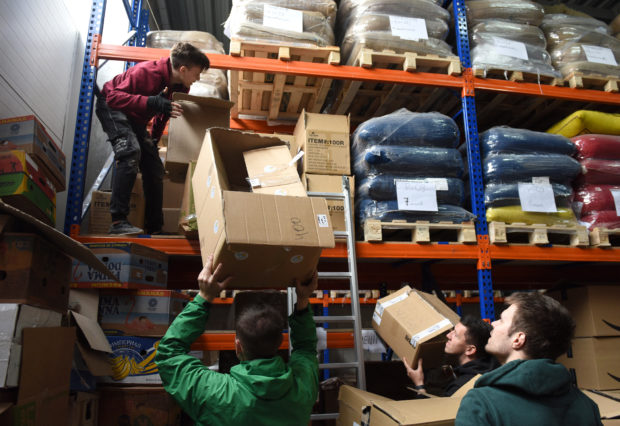Behind the frontlines, Ukrainians find world of ways to help

Volunteers work at warehouse on the outskirts of the western city of Lviv on April 15, 2022, from where they dispatch aid to those in need across the war-torn country. AFP
LVIV—Inside a packed warehouse in war-torn Ukraine, 35-year-old volunteer Roman Kolobochok said his friend on the frontline needed a sniper scope and he was going to find him one.
His friend had messaged him a website link for the telescopic lens he needed, and he was in the middle of ordering one from the United States.
In times of war, everybody should contribute with their best skill, said the veteran scout in the western region of Lviv.
“If you’re a good hustler, you should do it,” he said.
Standing between shelves stuffed high with donations from across the world, the improvised logistician is just one of a flurry of volunteers across Ukraine applying a range of talents to help.
Before the war, Kolobochok headed the souvenir department of a restaurant chain, but also travelled to the US through his job as a medical courier for a Ukraine-based surrogacy company, he said.
After Russia invaded on February 24, he asked his bosses at the restaurant business to borrow a corner of their warehouse.
Today, a team of fellow scouts receive requests for aid from across the country on a messaging app, then carefully match them up with available supplies on a multicoloured spread sheet.
The storehouse shelves are stacked with everything from sleeping bags and tents, to flour, coffee drinks, medical gloves and soap. In a medicine section, insulin sits in the fridge.
Boots and chainsaws
In recent days, the scouts have dispatched humanitarian and medical aid to the capital Kyiv, to the eastern city of Kharkiv and Mykolaiv near the Black Sea, Kolobochok says.
But with around 50 fellow scouts now fighting the Russians, his team are also actively looking for night-vision goggles, GPS systems, and army food ration packs.
The response has been overwhelming, he says.
Strangers are making donations and the Spanish scouts have sent in truckloads of aid. One American even took time off from work in Texas to fly to Philadelphia, where he picked up 100 trauma first aid kits he had bought and then drove them to a New York airport.
In just days, they managed to raise enough funds to buy a drone.
“The world is supporting us,” Kolobochok said.
At a different storage point in the city of Lviv, fellow scout Anastasiia Sokhatska stood amid piles of home-made camouflage nets, packs of mineral water, tactical boots, flags and a couple of boxed chainsaws for combatants to build hideouts.
When the army needs something, she says, she and fellow volunteers fundraise on social media, collect the supplies, and then make sure they are delivered.
“I need to help. This is my country,” she said, as beside her two young men packed up bags.
Earlier the same day, she had learned that a close friend due to celebrate his wedding this summer had been deployed very close to the Russian frontier.
“I just don’t have the possibility to do nothing,” said the 26-year-old, who used to work in the IT sector.
Being a woman has also been an asset.
Ukrainian men of fighting age are not allowed to leave Ukraine, but women can drive back and forth across the nearby Polish border, ferrying in donated goods and equipment.
“I go there because I’m a woman, and I can just go abroad,” she said.
Theater turned shelter
But it is not only scouts helping behind the frontlines.
When a huge wave of families escaping fighting arrived in Lviv at the start of the conflict, everybody pitched in however they could.
At the Les Kurbas Theatre in the city centre, actress and singer Natalia Rybka-Parkhomenko organised bedding for more than a dozen displaced people from her home city of Kharkiv to sleep on stage.
At another make-shift shelter housing hundreds of evacuees, veterinary student Dasha Bondarenko, 19, has for weeks been helping to check in new arrivals and find them fresh clothes.
When wedding organiser and taxi business owner Pavlo Bodnar, 29, could not get into the army, he headed out to volunteer at the train station.
He obtained a rare permit to drive his car during night-time curfew, and now offers free rides to people fleeing war, or even returning from abroad, when they arrive on the platform after 10 pm.
“I organised people who have cars because I’m in the car business,” he said.
Now “I have my own fleet of people who can transport people during curfew.”
RELATED STORIES
Zelensky repeats warning over Russian nuclear weapons
Fiji investigates arrival of Russian oligarch’s vessel, questions captain
Last residents of east Ukraine’s ghost city brave Russian bombs